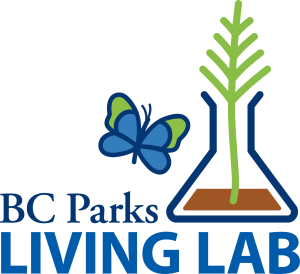BC Parks Living Lab for Climate Change & Conservation Program
Applications are now closed for 2026
Successful projects commence in the spring of 2026 and end in March 2027. We welcome applications for multi-year projects, but funding for these projects will still be considered on a year-by-year basis (i.e., we cannot guarantee funding for multiple years, but projects with a proven track record are more likely to receive funding in subsequent years). However, the Living Lab program is not intended to be a source of permanent, long-term funding. 2026 Applications will close on December 1, 2025 at 11:59pm. Funding decisions will be made in February 2026, and funds will be formally released in April 2026.
The BC Parks Living Lab for Climate Change and Conservation Program promotes B.C.’s protected areas as places to learn about the effects of climate change, how to mitigate and manage for these effects, and how to share this information among and between academics and practitioners. B.C.’s protected areas are less developed than much of the rest of the province, so parks serve as a “living lab,” and can help us understand the impact of climate change on the natural world. Climate-informed conservation research in protected areas can also reveal areas that are critical to connectivity within and adjacent to the protected areas system which in turn can inform management decisions.
Applicants are encouraged to consider the Living Lab Program’s goals and priority projects and research themes in their application. Please be explicit about how your proposed project is relevant to climate change and its impacts, including the management implications for BC Parks.
Each application will be considered on the basis of:
- Contribution to understanding climate change impacts and how BC’s provincial parks can be managed to mitigate risks and adapt to change;
- Objectives, methodology and approach;
- Qualifications and experience;
- Budget including other sources of funding (e.g., how Living Lab funding assistance contributes to other research or if there is an opportunity to leverage additional funds).
Successful applications will be chosen to ensure that the Living Lab research projects:
- Are endorsed by regional BC Parks staff (please attach any relevant correspondence in the file attachment section);
- Acknowledge and include Indigenous stewardship in the project proposal, its results and/or application of results; and
- Support improved management of the conservation, cultural and/or recreational values within B.C.’s provincial park system.
Eligibility:
- Lead applicants must be professors who hold a current teaching or research position with a public post-secondary institution in BC. Adjunct professors are not eligible for Living Lab funding.
- Organizations or individuals working in partnership with a professor as described above are also encouraged to apply.
- Lead applicants must reach out to regional BC Parks staff prior to submitting their application. Please provide details of your correspondence in your application.
- Researchers will be required to present virtually at the Living Lab eSummit.
Reconciliation with Indigenous Peoples is a priority for the government of British Columbia. Preference will be given to projects that work collaboratively with First Nations. For guidance on best practices when engaging with local First Nations, visit Consulting with First Nations – Province of British Columbia (gov.bc.ca). To help identify the traditional territory that overlaps with your project footprint, use the PIP Consultation Areas (gov.bc.ca) map tool. Please ensure that you engage First Nations to discuss your project prior to submitting your application.
You can strengthen your application by providing letters of support from First Nations or other interested parties (such as community groups and NGOs). Please attach copies of any such letters to your application below. Protocols for engagement with local First Nations must be part of your discussions with BC Parks staff. For information on First Nation engagement and help identifying the appropriate staff, contact Stephen Ban or Jeanine Bond.

